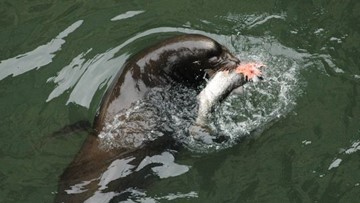
SALEM, Ore. (AP) — The Oregon Department of Fish & Wildlife says its latest attempt to discourage savvy sea lions from feasting on native fish at Willamette Falls has proven to be an exercise in futility.
The agency reports more than 25 California sea lions and Steller sea lions continue to prey on salmon, steelhead, sturgeon and lamprey at the falls between West Linn and Oregon City.
ODFW spent five weeks in February and March relocating 10 California sea lions to a beach south of Newport, Oregon, approximately 210 miles away, only to see the animals return within four to six days. One of the sea lions was even captured and relocated to the coast twice, but swam back both times.
Background: ODFW trapping sea lions near Willamette Falls, moving them to coast
Shaun Clements, ODFW senior policy adviser, said the problem is becoming increasingly dire as Upper Willamette Basin steelhead are pushed to the brink of extinction. This year's run currently stands at 1,338 steelhead — slightly higher than 2017, but far below historic steelhead returns that often topped 10,000 fish.
Biologists estimate that California sea lions ate at least 18 percent of returning adult steelhead prior to March. And unless something is done to control the predation, Clements said all other actions to protect the fish will not matter in the long run.
"This is one problem that's not being managed," he said.
Clements said sea lion predation is not the only thing harming salmon and steelhead in the Willamette Basin. Drought and operations at 13 federal dams have also had a sharp impact on the species' survival.
Most recently, the U.S. Army Corps of Engineers intends to build a 300-foot-tall water temperature control tower and floating screen at Detroit Dam on the North Santiam River to benefit the fish. The project is estimated to cost between $100 million and $250 million, and could require draining Detroit Lake for up to two years, leaving farmers without critical irrigation water.
All that work would be for naught if sea lions are left to eat the remaining fish, Clements said.
"Clearly our experience on the Willamette River this year demonstrated the futility of relocating sea lions as a way of stopping them from driving our native fish runs to extinction," Clements said.
ODFW applied in October 2017 to kill sea lions from Willamette Falls under the Marine Mammal Protection Act in order to protect threatened salmon and steelhead. Clements said they are still awaiting a final decision from the National Marine Fisheries Service.
Since President Richard Nixon signed the Marine Mammal Protection Act in 1972, Clements said the population of California sea lions has grown from around 70,000 to 300,000 individuals, and the Steller sea lion population has also increased from 30,000 to 70,000.
With the population increase has come more sea lions to prey on freshwater fish runs in the Pacific Northwest. It started in the late 1980s at Ballard Locks in Seattle, Clements said, and by the 2000s sea lions had arrived at Willamette Falls.
"It's our responsibility and mandate from the people of Oregon to ensure these fish runs continue," Clements said. "So it's incredibly frustrating to us that federal laws prevent us from taking the only steps effective at protecting these fish from predation."
Steelhead aren't the only fish species at risk, Clements said. Predation on white sturgeon has also increased dramatically this year, and sea lions are preying on fish in other rivers like the Sandy and Clackamas, he added.
Clements said changes are needed to the law that would allow wildlife managers to be more proactive when it comes to dealing with sea lions. He said ODFW is working with Oregon's congressional delegation on a possible solution.
In the meantime, the agency has decided to shift its focus to controlling sea lions at Bonneville Dam on the Columbia River, where they already have authorization to kill sea lions. ODFW does plan to leave its sea lion traps at Willamette Falls while continuing to monitor predation, but simply does not have enough staff to cover both locations.
© 2018 KGW
https://www.kgw.com/article/news/local/willamette-valley/sea-lion-relocation-fails-to-protect-willamette-falls-fish/283-546910440Bagikan Berita Ini














0 Response to "Sea lion relocation fails to protect Willamette Falls fish"
Post a Comment